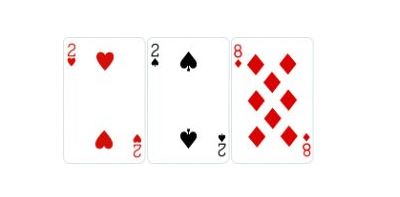No, slow play poker does not mean taking your time when playing. Slow-playing is a way of playing a deceptively in order to get more value out of a hand than you think would generate nothing otherwise. It’s one of the most satisfying ways to win chips but also risky. In this article I will briefly explain why people slow play, an example of slow playing and when it’s ok to.
Why Slow Play in Poker?
Sometimes you have to slow play your hand to get value, you won’t get anything out of an opponent otherwise. It’s not something you should be doing all the time, but there are certainly times and places for slow play poker. The sole reason to slow play, as with most poker moves, is to extract more value out of your hand.
Example of Slow Play
You have are in mid position and raise to 150 at 30/60 with:

It folds to the big blind who calls. Your opponent checks to you on a flop of:

Now ask yourself the following questions:
- What is my opponent likely to be holding?
- Is my opponent likely to call me?
- Do I need to bet to protect my hand here?
- How can I extract most value from the hand?
In the example above, your opponent is likely to have a wide range of hands (often nothing that connects with this board). Therefore, you can very safely slow play your full house here. There are no scare cards to your hand checking may induce bluffs later in the hand too.
When To Slow Play?
A slow play will be the best line to take when the conditions below are met:
- Our opponent is weak and very likely to fold to a bet
- My hand does not need to be bet and protected
- My opponent is likely to bet into me later in the hand or improve thus allowing me to get value
Small Bets & Calls
Slow playing does not just mean checking back hands, it might be flat calling bets or making small bets to induce raises. It’s the sense you give your opponent, the apparent weakness you convey that makes it a slow play or not.
For instance, if your opponent is the aggressor and bets all the way down and you flat call until your raise on the river and you showdown pocket aces or a flopped flush, that is also a slow play.
Don’t Go Too Far!
Slow plays are great when properly put into practice but you must be careful not to over use or slow play hands that can be beat easily enough. There’s no point slow playing top pair multi-way or even heads up only to lose to a turned inside straight. It takes experience and an understanding of the hand in question and your opponents range to recognise when a slow play is the most profitable line in a hand.
In the modern era where even beginners are aggressive, slow playing can be very profitable!
Photo by Nick Abrams @nbabrams




